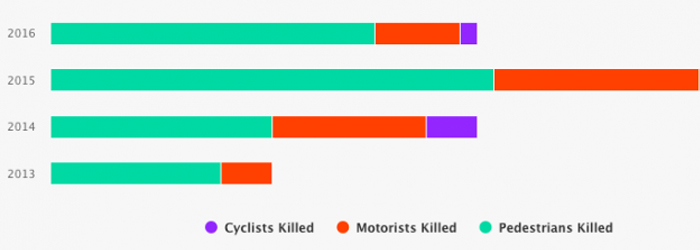Distracted driving is responsible for taking thousands of lives every year, at least that’s what we see stamped across headlines and news publications. A few thousand is a big number- however in comparison to the actual number of people who are killed in car accidents every year from distracted drivers, a few thousand would be a miraculous recovery.
Despite the lack of reported data across the U.S., the NYPD has been doing their part by tracking all collisions throughout New York City. Although the information is focused on only a single city, it provides a window into seeing just how big of a problem distracted driving has become. According to the data – between the years 2013 and 2016 there were over 115,000 reported car accidents due to distracted drivers. If you break this down it equates to almost 29,000 accidents every year for 4 years – that’s about 79 accidents each day that are solely caused by distracted drivers. These statistics don’t even represent the entire state let alone the entire U.S.
Distracted driving is exactly as it sounds – any activity that can take a drivers attention away from the primary task of driving. Nowadays the distractions are endless; texting while driving, using a smartphone, eating or drinking, reading books or maps, adjusting the radio, etc.
Are You Guilty of Distracted Driving?
The majority of drivers don’t need statistics to realize that distracted driving has become a serious problem on America’s roadways – or do they?
With an increase in technology for self-driving cars and several laws implemented to ban the use of cellphones while behind the wheel, the effort is stronger than ever to end distracted driving. However even with these laws, drivers can’t seem to hang up the phone.
According to Alex Omrani, a Queens car accident attorney, New York was one of the first states to implement a law against distracted driving. In 2014 the state upped their penalty for using a cell phone in any way while behind the wheel. While the penalty proved to be effective for a short period of time, recent data shows that car accident rates shot back up in 2016 to a number 3x higher than the previous year.
As accident numbers continue to increase, so do motor vehicle fatalities. According to data, NYC pedestrians have become particularly vulnerable to distracted drivers, accounting for more than 65% of distracted driving fatalities thus far, followed by motorists and cyclists.
NYC Distracted Driving Fatalities

To get a better understanding of who is is texting and driving, a survey conducted by the Center for Disease Control compiled the following information:
1. Teen girls are more likely to text and drive than teenage boys.
2. Contrary to the statistic above, adult men are more likely to text and drive than adult women – at 51% vs. 42%.
3. Drivers ages 18-29 are the biggest offenders of regularly checking their cell phones while behind the wheel.
4. Young Passengers are less likely to confront a driver who is texting while driving.
5. Young drivers are more likely to have been involved in either a near-crash experience or a crash that was caused by distracted driving.
6. Drivers younger than 25 are 3 times more likely to send a text or email while driving.
There are currently 14 states that have laws in place prohibiting all drivers from using hand-held cellphones while driving. There are 37 states banning all cell phone use by new or teenage drivers. There are 46 states that have a ban on texting while driving completely. As it is stated above, drivers don’t need statistics to realize that distracted driving has become a serious problem – but the numbers do amplify the dangers surrounding the problem.
What Can You Do To Prevent Distracted Driving?
As a passenger?
1. Request that the driver puts down the phone while behind the wheel
2. Offer to send a text or make a call for the driver, so they can focus on the road
3. Offer to help watch the road
As a parent?
1. Be a good role model and practice what you preach
2. Do not call or text your child if you know they might be driving
As a driver?
1. Turn off your cell phone while you are driving
2. Pull off to the side of the road to send a text or make a phone call
3. If you think you will be tempted to check your phone, avoid the temptation by putting it in the trunk or the back seat

